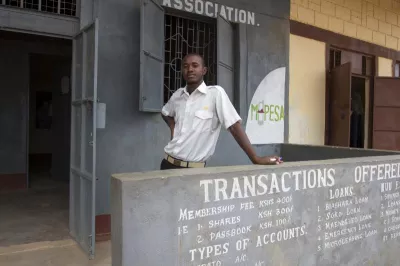Can Brazil’s Agents Provide a Wider Range of Services?
In this second post in the series on Brazil (read the first one here), we answer the first of the following two recurring questions about the agent business in Brazil: (1) Will agents become a channel for a wider range of financial services for the poor? (2) Will banks share agents and why has that not happened already?
Banco do Brasil agent in Brasilia The prevailing wisdom about Brazil’s vast agent network (largest in the world, 4x that of Kenya and the Philippines combined!) is that it is used mainly for bill payments. This network appears to be a missed opportunity to also make credit, savings, and other products available to low-income people in an affordable way. Is this channel being underutilized for poor people? (See here for agent numbers and here for coverage maps.)
The truth is that credit, savings and insurance have been made available via agents. Government benefits are also disbursed via agents. At the ~160,000 transactional agents, which include stores, the postal and lottery networks, customers make a variety of payments, deposit into and withdraw from accounts. Even though the role of transactional agents in the account opening process is restricted by regulation to ID check, document collection and forwarding, banks still use them to start the account opening process. In addition, there are ~500,000 credit agents, which are individuals on foot who sell payroll-consigned loans. While all banks use credit agents, small and medium banks rely on them for their core loan business. Both transactional and credit agents are covered by the same set of regulations.
While research indicates that the majority of transactions at transactional agents (70%+) are “bill” payments, the bills against which payments are received cover a range of services, not just utilities. Any service provider can issue a bill or boleto which can be paid at any agent (more on boletos here). The payments part of any financial product could be issued as a boleto. A lender can issue a boleto to borrowers for repayment. An insurance company can issue a boleto for premium payments.
While products are available at agents, it is also true that banks have not systematically developed products for the poor via the agent channel. A few factors are likely to play a part in how exactly banks end up using agents moving forward:
- Lawsuits. The banking employees unions are suing banks and agent companies arguing that agents should be treated like bank employees and paid accordingly (read this basic FAQ on these lawsuits). Banks argue that agents do a lot less than bank employees and their role is similar to a basic teller. If this line of argument allows banks and agent companies to win lawsuits (they have had some favorable rulings already), it will mean that while banks may not be able to develop the agent channel to do more (into a sales and service channel, for instance), they can continue to use agents to process boletos.
- Regulations. New regulations that came out four months ago have very nearly eliminated any business from doing just the banking agent business. The regulations prohibit agents whose sole function is that of a transactional agent from receiving and forwarding account opening proposals and processing receipts, payments and electronic transfers for bank deposit and payment orders. As a result, banks will continue to face natural time and bandwidth restrictions on how much an agent does.
- Viability. An implication of these new regulations and lawsuits is that transactional agents can perform nothing more than a basic teller function. Will banks and agents find this limited role economically attractive moving forward? Historically, banks have paid little to agents to handle transactions and agent companies stay in business only because banks pay more for account opening and for loans offered by credit agents. Moreover, at higher transactional volumes, fixed cost infrastructure like ATMs is more economical for banks. In fact, banks are exploring ATM-like alternatives to agents especially in higher volume urban areas where most Brazilians reside anyway.
- Channel strategy. Large banks in Brazil already own large acquiring networks and with boletos becoming electronic (read here), the difference between payments at those networks and agents disappears. While a number of municipalities in the most economically poor areas of the North and Northeast are serviced only by agents today, banks have been known to open mini-branches and install ATMs on the heels of agents, and they may do more of that. More importantly, a couple of banks in the process of developing services for lower-income segments are not necessarily restricting themselves to agents but considering leveraging all their channels.
- Kabir Kumar & Yanina Seltzer




Add new comment